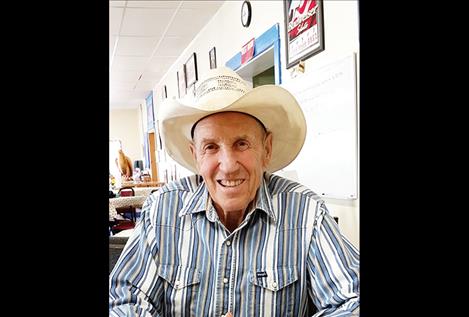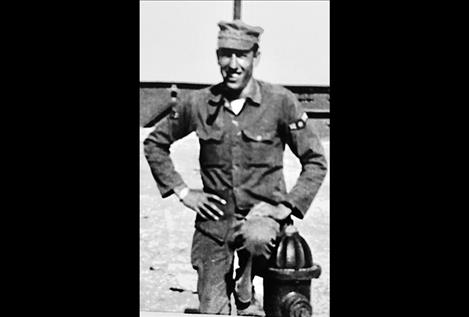Veteran Spotlight
Larry Ruffatto November 18, 1931 Korea: Staff Sergeant U.S. Air Force
Hey savvy news reader! Thanks for choosing local.
You are now reading
1 of 3 free articles.
When Larry Raffatto got his draft notice, he had about 10-14 days to exercise an option to enlist rather than be drafted. He didn’t want to go to the Army. He went to see the Navy recruiter in Missoula, but their quota was full. He went down the hall to the Air Force recruiter and got the same story. “Oh, well,” he thought as he left, “I’ll just get drafted.” Just then the Air Force recruiter chased him down the hall and said one more opening was available. He signed up and was sworn in at Butte, Dec. 7, 1951, – the anniversary of the attack on Pearl Harbor.
It took Larry Raffatto six days by train to get to boot camp in Lackland, Texas, for basic training. It was the “milk run” and the train stopped at every little jerkwater. He joined the Air Force to fly, but was told, “No.” His aptitude test showed potential to be a mechanic so he was sent to Sheppard AFB, near Wichita Falls, Texas, for aircraft and engine school. From there he went to jet engine specialist school at Chanute AFB, near Chicago, Illinois. His next assignment for about three months was at Luke AFB near Phoenix, Arizona.
Larry then shipped out to Laughlin AFB in Del Rio, Texas. This was an old WWII pilot training base that was being built back up. The base had just been reopened and the barracks weren’t finished so Larry’s group was housed, three to a room, in the finished half of the building. No planes arrived to be worked on until two months later. It was hot in Del Rio and the men were bored to death. Larry says they listened out the window to roll call, but their names were never on it. They reported to their Sergeant who finally said, “Don’t come down every day. I’ll call when I need you.” They fell out on the flight line, but with no planes to service, they spent time pulling weeds and whittling.
There was daily room inspection and no one wanted to be caught in the room so they drew straws to see who would go hide in the lockers while the loser locked them in. The loser was under threat of death to reopen the lockers after inspection.
Finally, planes arrived: the 1-seat F-80’s and the 2-seat T-33’s. The base also trained pilots from other countries. Larry’s job was to fix up planes that were damaged in training accidents. Part of pilot training was strafe practice, shooting into wooden targets. Sometimes the pilots didn’t pull up quick enough and Larry would find himself picking pieces of wood out of the engines.
Larry went to Japan where he spent the rest of his 4-year enlistment - in close quarters - 12 to a room. He only worked on jet engines - the closest he ever got to actually going up in a plane was to sit in the cockpit. Emphasis was shifting regarding Viet Nam and mechanics were shaping up planes to fly back to the States. Larry liked Japan. He remembers being in Tokyo and often hiring a rickshaw to see the sights. Tokyo was so busy. On the main streets you went one way down the sidewalk on one side of the street and the other way on the other side of the street. If you missed a store you wanted to go into, you had to keep going to the corner, cross over and go all the way around to get back to that store.
He and a buddy bought bicycles and spent weekends riding around the countryside. There were really little farms and that’s all the people had. They always took packages of gum for the little kids. Sometimes there would be more than fifteen kids in line waiting for a stick of gum. There didn’t seem to be animosity from the Japanese people, and some worked in the same mechanical shop with the G.I.’s (soldiers in the U.S. military.)
It’s ironic that although Larry was in the Air Force, he traveled stateside by bus or train and to and from Japan by ship - while Marines often flew.
Larry said his service time was good experience and he has no regrets. He learned a lot. He still keeps in contact by phone with his buddy “Hall” who now lives in North Carolina. Larry thought about staying in and making a career of the military but after the reenlistment talk he decided he liked Montana better. His rank was frozen at Staff Sgt. and he was discharged at Parks AFB, California, in November of 1955.
Larry thinks having a draft would be good, and for gals, too. The military would provide training for young people, especially if they are at loose ends, and there are better benefits now than when he was in.
Once out of the service, Larry continued to use his mechanical skills working on United Nations planes for Boeing at Larson AFB in Moses Lake, Washington. When the Viet Nam war ended there was talk of moving the facility’s work farther east so Larry returned to Montana. He can be seen around Ronan today … wearing a cowboy hat and sandals.
Thank you for your service, Larry.

















